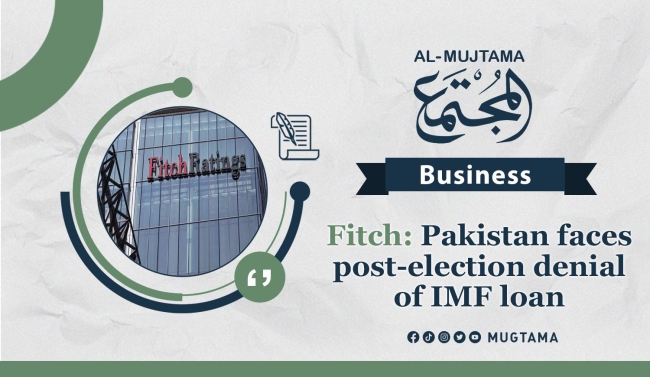Fitch: Pakistan faces post-election denial of IMF loan
Global ratings agency Fitch has warned that an uncertain February 8 election outcome could complicate Pakistan’s efforts to reach an economic deal with the International Monetary Fund.
Pakistan held a general election in which about 61 million people voted, no political party won a parliamentary majority qualified to form a government, creating an atmosphere of political uncertainty
After the election results, the People's Party and the Muslim League - Nawaz Sharif's party - began trying to reach a power-sharing deal.
On the other hand, Tehreek-e-Insaf (whose leader Imran Khan is in jail) announced an alliance with the Sunni Coalition Council.
In a report on Monday, Fitch raised U.S.-based equity ratings. It was important to the file
The ratings firm highlighted that although Pakistan's external position has improved in recent months - such as Pakistan's central bank reporting foreign currency reserves of $8 billion as of February 9 - but this is nothing compared to the anticipated external financing needs.
Fitch has indicated that the weak external rating of sovereign bonds means access to finance will be one of the most important issues on the next government’s agenda
Finalizing a new deal with the International Monetary Fund could be difficult, Fitch said.
Shehbaz Rane, economic analyst at The Express Tribune and anchor at The Express News
Expert opinion
Al Jazeera Net met with Pakistani economic and political analysts, as they discussed the electoral process and its results, and the ensuing debate between parties to form the government and warned of the negative impact of situation a politically uncertain effects on the Pakistani economy.
Their biggest concern is the failure of the International Monetary Fund loan project that Pakistan has been negotiating over months and has reached its final stages, due to the failure of the Fund to find a strong government capable of negotiating and gaining confidence.
For this reason, says Shehbaz Rana, an economic analyst with The Express Tribune newspaper, Pakistan’s food imports include edible oils and fruits, adding that annual food bills on imports between $6 billion and $8 billion.
He added, in an earlier interview to Al Jazeera Net that Pakistan was facing a disastrous crisis due to the foreign debt level exceeding $128 billion, coupled with debt management which was eroding the entire financial system.
Last June, Islamabad narrowly avoided defaulting on a loan worth $3 billion from the International Monetary Fund, he pointed out. However, loans from the Treasury brought with them difficult conditions and changes that would directly affect the situation of the people.
As part of the deal, the government agreed to new tariffs on the struggling energy sector and reduced subsidies, leading to a major boost.
----------
Agencies


